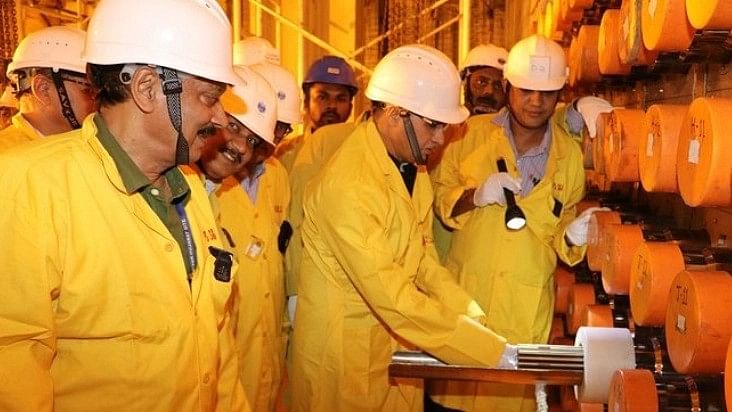
Bhuwan Chandra Pathak, CMD at Gujarat site.
Credit: Instagram/npcilofficial
Mumbai: After the records in operation of 220 MW Pressurised Heavy Water Reactors, the Nuclear Power Corporation of India Ltd (NPCIL) is now going strong on optimising and standardising the design of 700 MW reactors with several passive safety systems.
“Our records in operation of 220 MW PHWRs are world renowned. We are now going strong on optimizing and standardizing the design of 700 MW reactors with several passive safety systems,” NPCIL Chairman and Managing Director Bhuwan Chandra Pathak.
According to him, nuclear capacity in the country is going to increase by 14,500 MW in the coming decade.
Pathak’s statement came at the Indian Nuclear Society’s International Conference INSIC-2023 on the theme Nuclear for Clean Energy Transition was inaugurated at the DAE Convention Centre in Mumbai.
Bhabha Atomic Research Centre (BARC) Director Vivek Bhasin emphasized the need for accelerating the growth of nuclear power so as to replace fossil fuel based power plants at a fast pace.
He also expressed the need for strong regulatory relook in the background of strong defense in depth design.
INS President Prof. B.N. Jagatap in his presidential address said that in order to restrict the global temperature rise to 1.5 0 C, the world needs to achieve an energy mix with 54 per cent renewables, 33 per cent nuclear and 13 per cent fossil. This would need to triple or almost quadruple the energy by 2050.
He said that during the COP-28 summit held recently at Dubai, many countries have declared tripling their nuclear capacity. He further said that nuclear renaissance will call for life extension and management of aging nuclear reactors, accelerated growth of nuclear power through
Gen III and III + nuclear reactors and rapid progress in innovative nuclear technologies like SMRs, nuclear hydrogen and breeder reactors etc.
He informed that during the conference, Indian Nuclear Society is going to sign cooperation agreements with the French Nuclear Society and European Nuclear Society.
During the scientific sessions, Serge Gorlin from World Nuclear Association, UK, talked on the road map for increasing nuclear power three to four-fold by 2050.
Prof R Srikanth presented key policy changes that are needed to enhance Nuclear Power in India’s pathway to Net Zero. Former Ambassador (Retd.) DP Srivastava spoke on the role of nuclear power in India's energy transition.
There was a panel discussion on Role of Nuclear and Renewables in Clean Energy Transition. It was chaired by Dr R B Grover from Homi Bhabha National Institute. The panelists were D P Srivastava, from Vivekananda International Foundation, New Delhi, Suneet Singh from IIT, Mumbai, R Srikanth from NIAS, Bangalore, and A K Balasubrahmanian formerly from NPCIL.